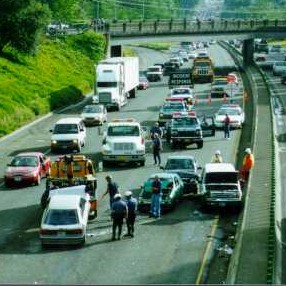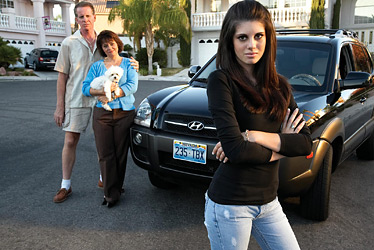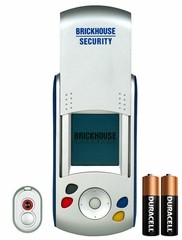Teen’s are terrible drivers. Their unique combination of inexperience and raging hormones make them them the most likely among all age ranges to get into fatal car crashes. As concerned parents we want to get our teens to drive safely and to obey the rules of the road, especially when driving home at night or when their friends are with them in the car. These are the times that we wish that the beneficial effect that we have on our teen’s driving would be felt the most, but these are often the times when our child is the least likely to drive like we are right there with them.

I have already talked extensively about how GPS tracking can put you in the car with your teen, so I am not going to rehash that discussion here in full. Instead, I thought it might be a good idea to discuss some of the different parenting techniques that we can employ once we have installed the GPS tracking device inside out teen’s car. We will begin with a discussion of the teen’s rewards and follow that up with a discussion of the punishments associated with bad driving practices.
But before we do, we should look at some of these important teen tracking tips:
- Tell your teen about the tracker – You cannot make the punishment and reward system for safe driving work for your family if your teen is unaware that the GPS tracking device exists. Tell them about your plan in such a way that they will get on board with your desire to monitor their driving activity. Even if they don’t like the idea at first, they will warm up to it after you lay out some effective rewards and punishment.
- Be very clear about the rewards – Communicating clear and worthwhile rewards to your teen is going to make this whole process a lot easy. They need to know the answer to the question “What’s in it for me?” question right away.  If you can’t communicate that to the in 5 minutes then you need to rethink your reward system communication.
- Be even clearer about the punishments – You are probably going to need to punish your teen driver at one point in time. The best way to do so is to communicate the consequences of their actions very, very clearly. They need to know exactly what is going to happen to them when they do something wrong so that there is no room for them wiggle out of the consequences of the action that the GPS tracker caught them doing.
- Make it fun and safe – Teen’s love the idea of “fun” and, as a parent, if you can make something that you want them do be fun then you are well on your way to getting them to successfully accomplish that which you want them to. It can be very satisfying as a parent to watch your teen act safely because they value it and think it is “fun” – you know that all your hard work is really paying off!
How To Reward Your Teen
Rewarding your teen should be more about character than about materialistic things. What I mean by this is that you want to reward your teen with added responsibility and freedom than with cool toys and nice clothes. You want your teen to grow up and experience what life is like for themselves, not treat them like a little child who is motivated by empty and shallow things. So in order to do that you need to sit down and think about what ways you can reward your child’s good driving habits that will enable them to mature and grow into the full person that they are meant to be.
An example reward might be something like an extended curfew or additional car use privledges. By extending their curfew you are communicating to your teen that their driving habits are safe and that they are worthy to be trusted. The more personal freedom that you give your teen, the more that you teach them being wise and safe is a good thing to do, the more you will teach your teen to be an upstanding member of society and a good person.
Another similar example of this is by giving your teen additional car use privledges. You could let them drive the car to a friends house or to the mall. You might even begin to trust them with driving their siblings to after school activities or sporting events. Either way, your teen will learn that their behavior is being rewarded by giving them greater access to the family vehicle.
So that covers the actual rewards that one might think of giving their teen, but what about the things that the teen will be rewarded for? You obviously want to reward them for good driving habits, but what exactly are the habits that you most want to reward?
Here is a list of some of the more important driving practices:
- Obeying the speed limit – This is very easy to monitor using a GPS tracking device for cars. Since they take constant measurements of the vehicles position all they need to do to calucluate speed is take the distance traveled and divide it by the time elapsed. Most GPS devices can monitor speed even if they aren’t a GPS tracking device, so it is pretty easy for parents to monitor this aspect of their teen’s driving. (This is also very important for saving money on gas costs!)
- Taking turns at appropriate speeds – Because you can monitor their speed it is easy enough to find their speed when taking turns. Taking a turn too fast can signify inexperience on the part of your teen or that they pulled out in front of oncoming traffic, both things that you want to try and avoid if possible.
- Making smooth starts and stops – Brakes are expensive and engines like to opperate under gradual increases of speed. A smart, safe driver will treat their car right and reduce the need for preventable maintenance on their vehicle.
- No erratic driving patterns – Tracking units are very percise, with some models being able to tell which lane a vehicle is in! If your teen is switching lanes wildly then you will know that they are not driving safely. You can also be able to see that their vehicle changes lanes well or makes turns in an appropriate fashion.
If your teen meets your safe driving requirement then it is time to reward them, but if they don’t you need to dole out punishments.
How To Punish Your Teen
When punishing your teen for poor driving I would recommend going with character punishments. A teenager must know that the consequences of bad driving are very real and very, very serious. Lives are on the line every time you step behind the wheel and a teen should be able to feel that when they do something stupid with a car.
A character punish could be something as sever as a suspension of car driving privileges, but it can also be something not necessarily car related. In my opinion, taking away a teen’s driving privileges should only be done in the most dire conditions.  This is mainly because a teen cannot learn to drive safely if they are not driving at all, but also because it can be very convenient for a family to have an additional driver in the house – especially if they help with some of the driving responsibilities that the family has.
Some more modest character punishment that you might consider could be:
- Suspension of computer privileges
- Limits on cell phone usage
- Making them stay home when normally they would allowed to go out
- Limiting their TV watching
- Ending access to video game systems or computer games
- Making their curfew earlier in the evening
- Having them do some sort of task as “punishment” – like clear brush, pick up trash on the side of the highway, or visit accident victims in the hospital
All of these consequences for bad driving won’t work for every teen, but if you can find the right combination for your teen then you stand a good chance of getting them to drive safely with a solid combination of rewards and punishments.
How To Set Up The System
If your teen meets your driving requirements then it is time to give them some rewards. I recommend that you set some type of quota based on the number of hours driven rather on a number of days or just deciding to reward your teen whenever you feel like it. The more experience your teen gets behind the wheel the more likely they are to drive safely when they are out of the house and out on their own.
I definitely recommend starting small. If they can last the first 100 hours of driving and drive in such a way that they honor your family’s good driving practices then they can get one of the minor character rewards set up in your system. Maybe you grant them some additional free time for them to do with what they will or you begin asking them to drive a younger sibling to one of their practices once a week.
100 hours certainly isn’t a hard and fast rule, but when you think about 100 hours can add up really fast, especially if you live far away from a lot of things in your life. A 15 minute drive to school in the morning and then another 15 minutes home turns into 100 hours in 200 days. That is approximately one school year – and that is only if they drive to school. With all the time they spend heading out to the movies or over to a friends house the time is really going to add up fast. Before you know, after 3 months they are going to be ready for their first reward if they have driven well.
I also recommend that when you punish a teen it is because of repeat offenses. So you might knock their curfew back 15 minutes if they perform 3 sudden stops over a 3 month period. Or you might suspend their cell phone use for violating the speed limit two times over a 6 month period. Feel free to get creative with your own set of rules – just make sure that you live up to the same standard as your teen!
With GPS, Teen Drivers Can Be Safe Drivers

If you work your system correctly and you know your teen driver then you can get them to drive safely even if you aren’t in the car with them. By installing GPS tracking device in their car and by setting up a quality, well-communicated reward and punishment system you can make safe driving something that everyone in your family is able to do – even if they are inexperienced and raging with hormones. It is important to note that is not going to be the solution for every family. Some GPS tracking systems can cost hundreds of dollars on the outset and still have a reoccuring subscription fee equivalent to a cell phone plan. But for those families that can afford something like this it can empower you as a parent to help make your teen a safe driver.
 Short range child locators are excellent because they provide instant feedback for parents. The device to the right is from Brickhouse Security, the company featured in a Duracell commercial found on cable television. This child tracker provides parents holding the unit in the center with the general direction and distance of their son or daughter who is equipped with the device pictured on the left.
Short range child locators are excellent because they provide instant feedback for parents. The device to the right is from Brickhouse Security, the company featured in a Duracell commercial found on cable television. This child tracker provides parents holding the unit in the center with the general direction and distance of their son or daughter who is equipped with the device pictured on the left.